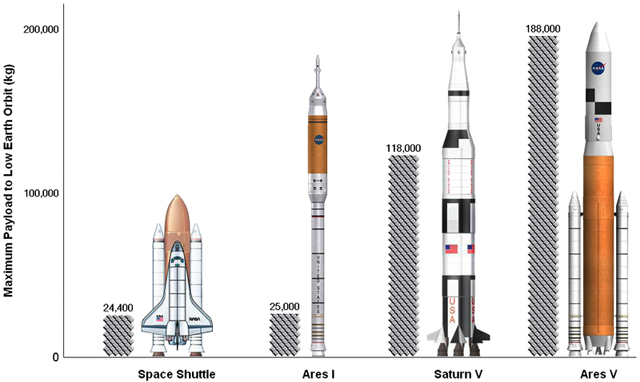But if you don't do it,
you come to a standstill
and progress is halted."
I must say, I agree with Greg Fish's recent post over at World of Weird Things. In fact, I agree rather vehemently. I've bemoaned in the past, how human technology seems to be stagnating in many areas. Indeed, in that same rant almost a year ago, I drew reference to how the proposed Orion Spacecraft, part of NASA's Constellation program looked suspiciously similar to the, frankly, old fashioned space capsules that were used back during the early days.
Now granted, NASA have upgraded the design a bit since then, using newer technology. They're going to make them a little more spacious too, holding four to six astronauts. A definite improvement over the first space capsules. I've heard it said that the old Gemini spacecraft were so cramped that they weren't so much piloted as worn. But all the same, the fact remains that it's a capsule. A pressurised tin can. Quite a far cry from the feat of engineering that should be replacing the Space Shuttle's magnificent design. Instead, we're using new technology in an old design. A bit like rebuilding the Wright Brothers' plane and fitting it with satnav and radar. If you see what I (somewhat whimsically) mean.
I hasten to add that I'm not trying to be unduly critical. In fact, I'm a huge supporter of spaceflight, manned and unmanned. As a kid I used to eagerly anticipate the day when NASA might announce that they'd be sending people back to the Moon. My 10 year old daydreams would lead me to wonder what we might find, the day we finally made it to Mars. After all, we went to the Moon over ten years before I was born. Why shouldn't we be able to get to Mars within my lifetime. Sadly, that announcement never came. More and more often, people would speak wistfully of the days "when we went to the Moon", as if talking about a childhood holiday to Brighton or Lyme Regis. Where was the passion? Where was the drive to go back? To go further?
Unfortunately, now people are genuinely talking about going back, I find myself confused, wondering why they're using essentially the same methods they used 40 years ago. Don't get me wrong, here. Apollo worked. It worked quite successfully (despite early mishaps). A brand new 4-door family saloon car these days probably contains more sophisticated technology than those intrepid astronauts used to first set foot on the Moon, and I wouldn't dare belittle or diminish their achievement in any way. But... haven't we progressed at all?

Perhaps the thing I find most puzzling is exactly how much of this thing is going to essentially be disposable! The Saturn V that launched the Apollo missions was then, and still is now, the largest and most powerful launch vehicle ever constructed. The Constellation Program proposes to use not one, but two rockets per mission. One (Ares I) to carry the crew, and one (Ares V) to carry the cargo. Ares V will be by far and away the largest rocket ever. EVER. But really, in this age of recycling and conservation, is this really viable? Weren't we supposed to be working on fully reuseable spacecraft by now?
Spaceplanes were being developed. They were, until their budgets were cut, or their programs were cancelled. The X-33 and it's successor, the Orbital Space Plane should have been practically ready to fly by now. Instead, after investing hundreds of millions of dollars, the plugs were pulled, and these concepts were relegated to remain, simply, as concepts. The cancellation of the Orbital Space Plane was largely a reaction to the Space Shuttle Columbia disaster in 2003. Before the ill-fated STS-107, the Shuttles were deemed viable for use right up to about 2030. Afterwards, it was decided that an Apollo-style capsule would be safer for the crew. The days of the Shuttle were numbered.
Unfortunately, this leaves us having taken one step forward and two steps back. Recreating the Apollo missions seems to be the "safe" option, even inspite of the fact that the Apollo mission itself wasn't without its setbacks -- most notably, the catastrophe that was Apollo 1. Back then, that caused a major rethink and considerable reworking of the technology in order to prevent the same failure happening again. The result was that the remainder of the Apollo program (until it too was cancelled) was a resounding success (with one "sucessful failure"). Sadly, it seems that if the Apollo 1 incident happened tomorrow, it would probably see the cancellation of the entire Apollo program.
No comments:
Post a Comment